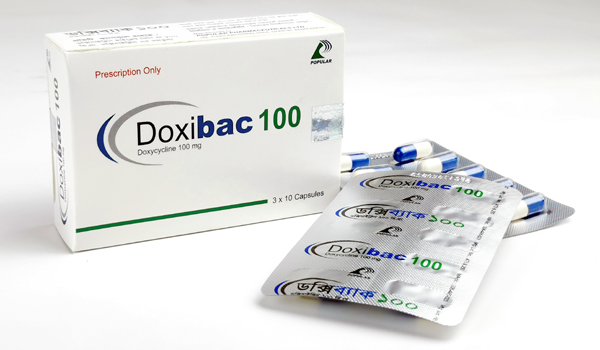Indication
Doxycycline has been found clinically effective in the treatment of a variety of infections caused by susceptible strains of gram-positive and gram-negative bacteria.<br>
Pneumonia: Single and multilobe pneumonia and bronchopneumonia due to susceptible strains of Streptococcus pneumonia, Staphylococcus, H. influenza and Klebsiella pneumoniae.<br>
Others: Genitourinary Tract Infection, Soft Tissue Infections, Ophthalmic Infection, Gastrointestinal Infections etc.
Dosage & Administration
The usual dose of Doxycyline is 200 mg on the first day of treatment (administered as a single dose or as 100 mg, every 12 hours) followed by maintenance dose of 100 mg/day (administered as a single dose, or as 50 mg every 12 hours) in the management of more severe infections (particularly chronic infection of the urinary tract) 200 mg daily should be given throughout the treatment period.<br>
Acne vulgaris: the recommended dose is Doxycyline 50 mg once daily treatment continues for a relatively long period, with the expectation of maximum improvement after about 3 or 4 months.
Use in Specific Population <br>
Use in Pregnancy and During Lactation: This drug should not be administered to pregnant women, unless in the judgment of the physician the potential benefit to the mother outweighs the risk to the fetus. Tetracyclines are excreted in the milk of lactating women. Therefore, the use of Doxycycline is not recommended in women while they are breast feeding.<br>
Use in Newborns, Infants and Children: Until safe conditions for use are established Doxycycline should not be administered to children under 8 years of age. As with other Tetracyclines, Doxycycline Hyclate forms a stable complex in any bone forming tissue. In premature infants given oral Tetracycline in doses of 25 mg/kg every six hours, decreased fibula growth rate has been observed. The reaction was shown to be reversible when the drug was discontinued.
Precautions
As with Tetracycline, Doxycyline may form a stable complex in any bone-forming tissue. In-vitro Doxycyline binds calcium less strongly than Tetracycline's. The use of Doxycyline during tooth development (last trimester of pregnancy, neonatal period and early childhood) may cause discoloration of teeth (yellow-gray-brownish). This Tetracycline effect is more commonly associated with long term use of the drug, but has been known to occur with treatment of short duration. Certain hypersensitive individuals may develop a photodynamic reaction precipitated by exposure to direct sunlight during the use of this drug. Individuals with a history of photosensitivity reactions should be instructed to avoid exposure to direct sunlight while under treatment with Tetracycline drug, and treatment should be discontinued at first evidence of skin discomfort.<br>
The use of antibiotics may occasionally result in overgrowth of non-susceptible organisms. Constant observation of the patient is essential. If a resistant infection appears, the antibiotic should be discontinued and appropriate therapy instituted.

